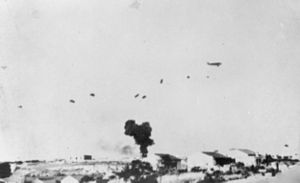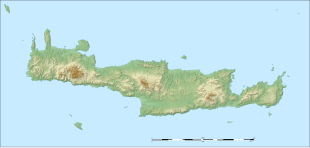| Battle of Heraklion | |||||||
|---|---|---|---|---|---|---|---|
| Part of World War II, Battle of Crete | |||||||
 German paratroopers dropping near Heraklion; a Ju 52 is visible and the smoke (centre) marks where another has crashed after being hit by anti-aircraft fire.[1] | |||||||
| |||||||
| Belligerents | |||||||
|
| |||||||
| Commanders and leaders | |||||||
|
|
| ||||||
The Battle of Heraklion was part of the Battle of Crete, fought during World War II on the Greek island of Crete between 20 and 30 May 1941. British, Australian and Greek forces of 14th Infantry Brigade, commanded by Brigadier Brian Chappel, defended Heraklion port and airfield against a German paratrooper attack by the 1st Parachute Regiment of the 7th Air Division, commanded by Colonel Bruno Bräuer.
The attack on Heraklion during the afternoon of 20 May was one of four airborne assaults on Crete that day, following German attacks against Maleme airfield and the main port of Chania in the west of Crete in the morning. The aircraft that dropped the morning attackers were scheduled to drop the 1st Regiment over Heraklion later the same day. Confusion and delays at the airfields in mainland Greece meant that the assault was launched without direct air support, and over several hours rather than simultaneously; some units were still at the airfields by the end of the day. Those German units dropping near Heraklion suffered very high casualties, both from ground fire and upon landing. Those dropping further away were severely hampered by armed Cretan civilians. The initial German attack failed; when it was renewed the next day it failed again. The fighting then settled into a stalemate.
A battalion of the German 5th Mountain Division was supposed to reinforce the paratroopers at Heraklion by sea, bringing with it artillery and anti-aircraft guns. It was delayed en route, diverted to Maleme, then intercepted by a British naval squadron and scattered. The German overall commander, Lieutenant-general Kurt Student, concentrated all resources on the battle for Maleme airfield, which the Germans won. The Allied Commander-in-Chief Middle East, General Archibald Wavell, ordered an evacuation of Crete on 27 May and the 14th Brigade was taken off by Allied warships on the night of 28/29 May. During the return to Alexandria two destroyers were sunk, two cruisers badly damaged, more than 440 Allied servicemen killed, over 250 wounded and 165 taken prisoner. Due to their heavy losses on Crete the Germans attempted no further large-scale airborne operations during the war.
- ^ Australian War Memorial 2021, P00090.074.
